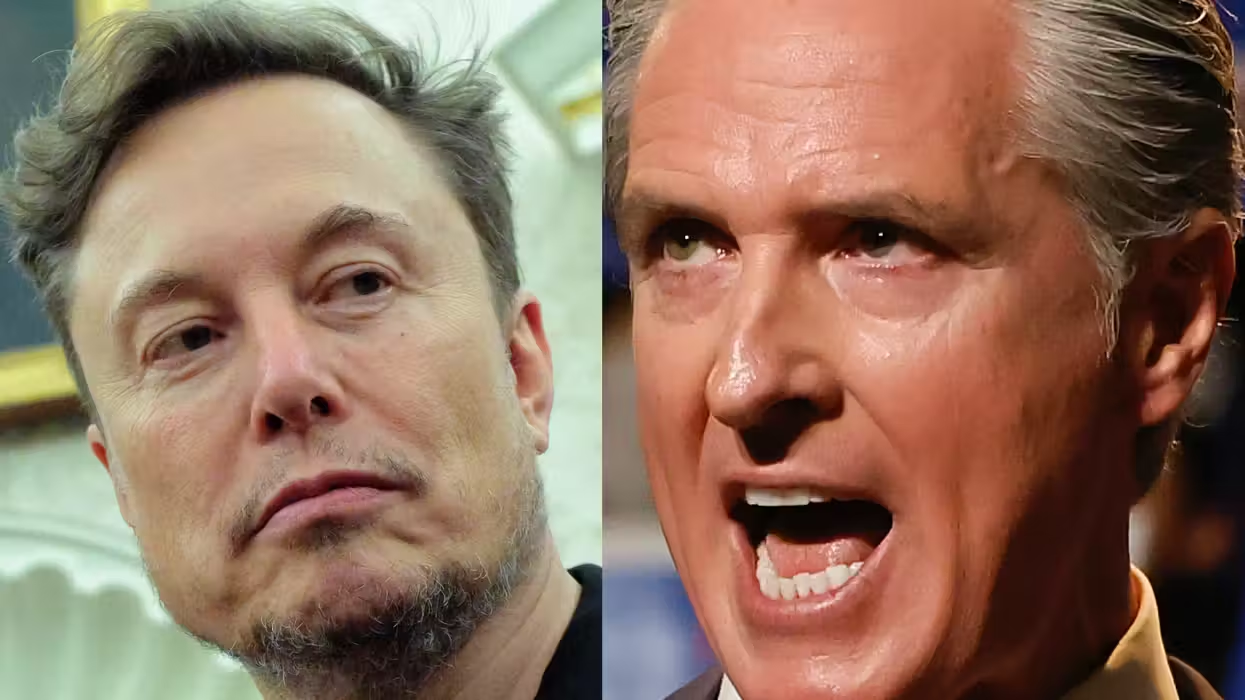© 2025 Blaze Media LLC. All rights reserved.
NJ Gov Chris Christie's Twitter post about issuing an executive order that would postpone Halloween in the Garden State got people thinking: If it's not safe to trick-or-treat, will the northeast corridor be safe enough to vote?
 Image: Twitter
Image: Twitter
Seven million people are without power in the wake of Hurricane Sandy. Estimates about how long it will take to restore the power vary from a couple of days to just over a week. According to FEMA's chief Craig Fugate, the delay in restoring power might play a role in the upcoming election. From his comments to the press last night:
"We are anticipating that, based on the storm, there could be impacts that would linger into next week and have impacts on the federal election."
The UK Telegraph reported that FEMA was considering using the agencies assets to help the election happen.
FEMA was examining how much it can pay to help rebuild any polling stations destroyed in the storm.
During yesterday's conference call with the press, the FEMA chief has also hinted that his agency might become more involved with the voting process.
"It's really too early to say what will be the impacts of the storm, and that's why it's again important that we'll be supporting the governors' teams and their supervisors of election or secretaries of state as they determine what ... assistance they may need."
Politico's Roger Simon reported on his Twitter account that Jay Carney was "not sure" if President Obama has the power to delay the national election:
 Image: Twitter
Image: Twitter
Our initial investigation shows that it is unlikely that any president would have the power to change or delay the day of the national election. Congress (which is not in session) would likely have to act to change the date -- currently the Tuesday after the first Monday in November. "As Hurricane Sandy threatens to cause widespread power outages lasting into next week, some voters are asking whether Election Day could be changed from Nov. 6.," the Wall Street Journal notes. "The answer is yes, but it would take an act of Congress."
However, Congress hasn't been interested in taking up the issue in the past. In 2004, Congress passed a resolution on changing presidential election dates stating:
"No single individual or agency should be given the authority to postpone the date of a Presidential election."
That resolution was a response to talk delaying voting due to a terrorist threat to the election of '04. The Star-Ledger of NJ reported that our current vice president had a strong opinion on changing election day:
"I think that is the worst idea in the world," Biden said in a 2004 interview on ABC's "This Week with George Stephanopoulos," according to a transcript. "Essentially acknowledging to the whole world we think we're going to be attacked before this happens, I think it is absolutely mindless with all due respect."
But while moving the date is unlikely on a national level, it is generally accepted that elections are the responsibility of each individual state and the power to delay them typically sits with the governor or the secretary of state. We did see some of the early voting suspended in the run-up to the arrival of Hurricane Sandy, but that action still offered voters the option to send in an absentee ballot or cast a ballot on November 6th.
Politco reports that Daniel Lowenstein of UCLA's Center for the Liberal Arts and Free Institutions has shared his opinion on postponing any election.
“There is always likely to be some bad weather somewhere and various other kinds of problems on election day. To warrant any kind of postponement of the election, it would have to be truly extraordinary and pretty widespread.”
The state laws regarding elections are fairly clear on what states can do if people are unable to vote. In some states governors and election boards are specifically permitted to change the election day. Courtesy of the Moritz College of Law at The Ohio State University.
Florida – The governor may suspend or delay any election after declaring a state of emergency. The rescheduled election must be held within 10 days of the original election, or as soon as possible thereafter. The Division of Elections must adopt an "elections emergency contingency plan". FLA. STAT. ANN. § 101.733 (West 2004) and FLA. ADMIN. CODE ANN. r. 1S-9.001 et seq. (2004).Georgia – If the governor declares a state of emergency, the secretary of state may postpone the date of any election by not more than 45 days. Ga. Code Ann. § 21-2-50.1 (2003).
Iowa – The secretary of state, in the role of state commissioner of election, may exercise emergency powers over any election affected by a disaster of natural or other origin. The secretary of state must adopt rules setting out the extent of the emergency powers and when they will be exercised. The current rules stipulate that no federal election may be postponed or suspended. IOWA CODE ANN. § 47.1 (West 2004) and IOWA ADMIN. CODE r. 721-21.1(47) (2004).
Maryland – The governor may declare a state of emergency, providing for the postponement of the election in all or part of the state in the emergency proclamation. MD. CODE ANN., ELEC. § 8-103 (2004).
New York – The State Board of Elections may order an additional day for voting, not more than twenty days after the original election, when a disaster causes fewer than 25% of eligible voters to actually be able to vote. N.Y. ELEC. LAW § 3-108 (McKinney 2001).
North Carolina – The Executive Director of the State Board of Elections may exercise emergency powers to conduct an election where the normal schedule for the election has been disrupted by a natural disaster, extremely inclement weather, or armed conflict. N.C. GEN. STAT. § 163-27.1 (2004).
Virginia – The governor may postpone an election not more than 14 days in areas affected by a declared state of emergency. VA. CODE ANN. § 24.2-603.1 (Michie 2004). UPDATE: It does appear that the Virginia Code mentions all local elections and primary elections for National office, but it does not say anything about a Presidential election.
What about the battleground state of Ohio? Ohio does not have a statement on delaying elections, but it does have an official process for temporary succession of power.
Ohio – "The General Assembly shall have the power and the immediate duty to pass laws to provide for prompt and temporary succession to the powers and duties of public offices, of whatever nature and whether filled by election or appointment, the incumbents of which may become unavailable for carrying on the powers and duties of such offices and to pass such other laws as may be necessary and proper for insuring the continuity of governmental operations in periods of emergency resulting from disasters caused by enemy attack." OHIO CONST. art. II, § 42.
What happens if a state cannot get its act together and hold elections before the Electoral College is slated to meet and electors vote? Cornell Law's website explains:
Whenever any State has held an election for the purpose of choosing electors, and has failed to make a choice on the day prescribed by law, the electors may be appointed on a subsequent day in such a manner as the legislature of such State may direct.
As the storm begins to move out and damage is assessed, states most seriously affected will be better able to decide on any adjustments made to their voting schedules (both early voting and Nov 6th balloting).
If any state makes a significant change, it is likely that legal challenges will be raised. TheBlaze will continue to monitor and update this story.
How do you feel about the movement of the election? Should states with serious power outages be allowed to move their election day from November 6th to a week later, November 13th?
Want to leave a tip?
We answer to you. Help keep our content free of advertisers and big tech censorship by leaving a tip today.
Want to join the conversation?
Already a subscriber?
more stories
Sign up for the Blaze newsletter
By signing up, you agree to our Privacy Policy and Terms of Use, and agree to receive content that may sometimes include advertisements. You may opt out at any time.
Related Content
© 2025 Blaze Media LLC. All rights reserved.
Get the stories that matter most delivered directly to your inbox.
By signing up, you agree to our Privacy Policy and Terms of Use, and agree to receive content that may sometimes include advertisements. You may opt out at any time.






